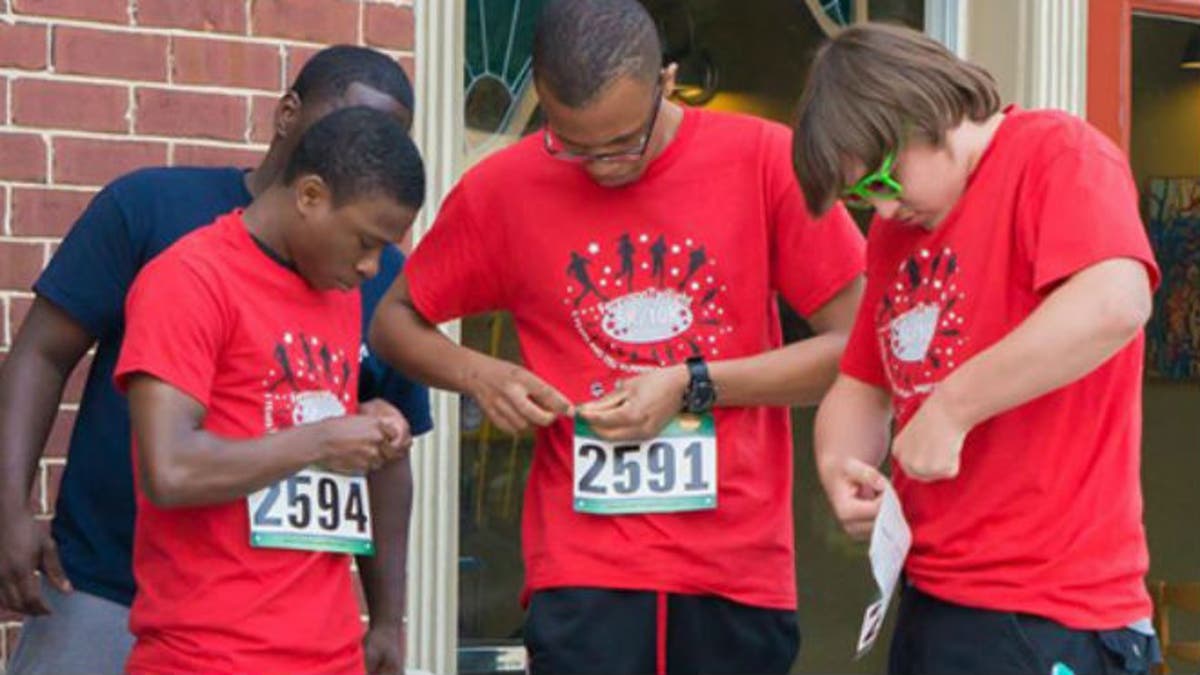
Young runners attach their bibs before this year's Ferguson Twilight Run. (Courtesy Ferguson/Twilight Run)
Sport is a unifying force even during tense protests.
At first, when violent protests followed the fatal shooting of an 18-year-old black man about a mile from her house in Ferguson, Missouri, Blue Tapp found herself doing the same thing as many of her neighbors. “I stayed in my house and watched the news and felt afraid and really depressed,” Tapp says.
Then, two mornings after the worst unrest, she went for a run.
“Getting out there into the neighborhood, it really started the healing process for me,” says Tapp, a website designer and a cofounder of the Ferguson Running Club.
So she told her running friends: “Don’t stay in your houses. Don’t sit there watching the news. Get out there and run.”
Running in particular, and fitness in general, turns out to have had more than healing power in Ferguson. People in the city say it has historically helped narrow divides between people of different races, ages, and genders.
RELATED: How Running Changed My Life
A group called Live Well Ferguson, begun in 2009, encourages exercise and healthy eating, has successfully lobbied for running and cycling routes and to have some streets shut down on Sundays for running and riding, and offers an earn-a-bike program, among other things.
Its most popular event is a 5K and 10K called the Twilight Run, which has more than doubled in field size from 900 to about 2,000 this year, when organizers were forced to close registration in this city of 21,000 because so many people signed up.
“It’s very mixed--black, white, old, young,” says John Cross, a Ferguson native and a runner who helps put together the event, held each May, which was the brainchild of black city councilman and runner Dwayne James. “It bridges that gap, for sure.”
The run “has done a great job in bringing in a diverse crowd of participants, be it in race, age, or running ability,” James says.
RELATED: Troubled Teens Find Direction Through Running
He says he considers the race an important part of the city’s future, too. “As we start to heal, every action and every event should be a part of the healing process.”
So closely associated is the Twilight Run with racial unity in Ferguson that, on the first weekend of the protests, activists asked residents of all races to wear their race shirts.
Tapp was one of the many who did. “I run in Ferguson. I run on these streets every week,” she says. “And the Twilight Run is a big event for us in Ferguson. It’s not just a run.”
Neither are the Saturday morning running-club runs, led by Cross, who is white, which he says are racially integrated.
PLUS: Why is Running So White?
“The way they’re portraying us in the media is breaking our hearts, because we’re not the community they’re describing,” Tapp says. “All of these events attract a rainbow of people, because that’s what Ferguson is.”
Tapp, who is also white, helped create a couch-to-5K training program that precedes each year’s Twilight Run.
“It’s been really rewarding to me to work with a bunch of African-American women, in particular, and get them running,” she says. “Any time you’ve got these events, you’re working together. And you have a bond with people that you run with that you don’t have with other people.”
TRY IT: Niche Running Groups Make Running More Inclusive
Ferguson runners say they have continued to follow their regular routes, even when--as for Cross--those routes take them through the two neighborhoods most heavily damaged during nights of protests. Tapp regularly runs past the police station, where there have been continual demonstrations and cadres of reporters tethered to satellite trucks.
“I try not to overthink things any more than any other time I go out running,” Cross says. “Those are just parts of my run. I’m not going to stop going past them just because something happened over there. I can only speak for myself, but I really don’t pay any attention to it. I’m just running. I’m out for my run.”
If anything, it’s heat and high humidity that has kept some Ferguson runners off the road these last two weeks, they say--not the protests.
“I tend to think that most runners in Ferguson are going to keep getting out there,” Tapp says, “and doing what we do.”







































